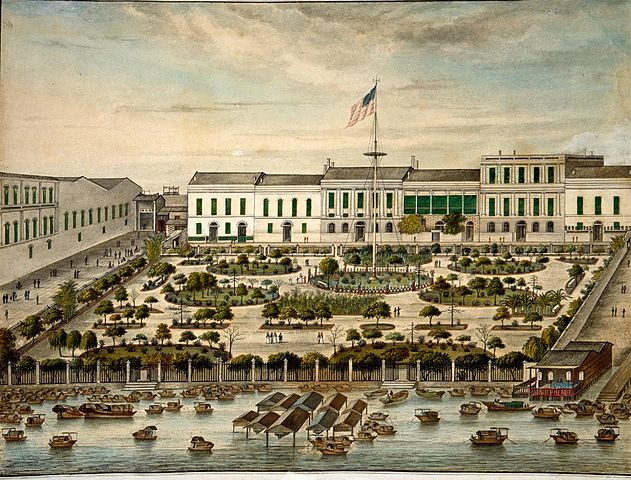Since the earliest days of European colonialism, the vast Chinese market had always attracted significant interest. As president, Taft hoped to make use of his predecessor's Open Door policy to increase U.S. exports to China's seemingly limitless market.

prepare to divide China.
First, Secretary Knox tried to position the U.S. in an advantageous position relative to the Europeans and Japanese. His plan was to exploit dollar diplomacy by controlling Chinese and Manchurian markets. Not surprisingly, Europe and Japan felt that U.S. adherence to the Monroe Doctrine complicated its role in Asia. In particular, the Taft administration's economic measures in Manila and China posed a challenge to Japan, which believed these territories fell within its own sphere of influence--not that of the United States. However, Taft was convinced by Knox that it would be beneficial to purchase Chinese railroads constructed by Russia and Japan.
Knox assumed that Japan would be unwilling to negotiate with the U.S. regarding such a sensitive proposition, so a back-up plan was prepared: If Japan refused to part with their railroad infrastructure in China, then the Taft administration would construct a road system with funding from U.S. banks. China had no objection to accepting U.S. loans for additional railroad construction and infrastructure development. The presence of so many foreign powers in China was reassuring to Chinese leaders; it prevented any single nation from gaining substantial concessions since the others would promptly object. Also, U.S. presence was generally welcomed due to the lengthy history of commercial relations between the two nations.

Taft remained concerned about Japanese or European monopolization of Chinese investment, but the U.S. was a late entry into the Chinese diplomatic arena, and even the vast wealth of U.S. banking institutions had little impact on the situation. In fact, during Taft's administration, U.S. trade with China decreased significantly. The nations of Europe--with support from Japan and Russia--had essentially closed the Open Door as far as U.S. investment in China was concerned. Taft's dollar diplomacy suffered its most dramatic failure, largely due to what other nations saw as America's expansionist aims.
The U.S. had originally sent troops into China in 1900 during the late stages of the Boxer Rebellion. However, the use of dollar diplomacy in China led to long-term U.S. involvement: American troops remained stationed there for several decades.
How did dollar diplomacy impact the United States' presence and performance in China? Use these questions to clarify the key points.
Which Asian nation believed that the Philippines were in its "sphere of influence"?
- Japan
- Korea
- China
- Indonesia
The rising imperial power of Japan regarded both China and the Philippines much as the US regarded Latin America and the Caribbean.
The rising imperial power of Japan regarded both China and the Philippines much as the US regarded Latin America and the Caribbean.
The rising imperial power of Japan regarded both China and the Philippines much as the US regarded Latin America and the Caribbean.
The rising imperial power of Japan regarded both China and the Philippines much as the US regarded Latin America and the Caribbean.
One reason that the provisional government in China did not object to the presence of numerous foreign powers was
- they knew they would end up in a war against each other
- they believed they could sell more weapons to the foreign countries
- the government supported revolution
- they knew that no single country would be able to occupy China
Prior occupation by the United Kingdom since there were no major powers to oppose them, so China preferred the intervention of numerous countries simultaneously.
Prior occupation by the United Kingdom since there were no major powers to oppose them, so China preferred the intervention of numerous countries simultaneously.
Prior occupation by the United Kingdom since there were no major powers to oppose them, so China preferred the intervention of numerous countries simultaneously.
Prior occupation by the United Kingdom since there were no major powers to oppose them, so China preferred the intervention of numerous countries simultaneously.
Which two nations that had recently fought a war (1904-1905) joined together during the Taft administration to oppose U.S. commercial involvement in China?
- the UK and France
- France and Spain
- Russia and Japan
- Japan and the UK
Roosevelt had helped to broker a treaty following the Russo-Japanese War in order to improve the conditions for U.S. commercial expansion, but this policy backfired in China.
Roosevelt had helped to broker a treaty following the Russo-Japanese War in order to improve the conditions for U.S. commercial expansion, but this policy backfired in China.
Roosevelt had helped to broker a treaty following the Russo-Japanese War in order to improve the conditions for U.S. commercial expansion, but this policy backfired in China.
Roosevelt had helped to broker a treaty following the Russo-Japanese War in order to improve the conditions for U.S. commercial expansion, but this policy backfired in China.
Summary
 Questions answered correctly:
Questions answered correctly:
 Questions answered incorrectly:
Questions answered incorrectly:
Question
How were the "dollars" used in dollar diplomacy?
